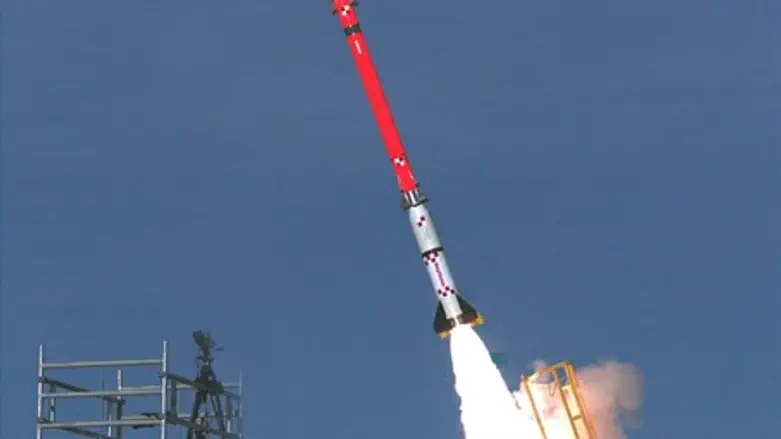
Israeli and US defense officials on Wednesday successfully carried out a second intercept test of a new system against short-range missiles, the defense ministry said.
"The Israel Missile Defense Organisation and the US Missile Defense Agency completed a successful intercept test of the David's Sling Weapon System (DSWS) against a short-range ballistic missile today," it said in a statement.
"This is the second intercept test of the Stunner interceptor for the DSWS. The intercept test was conducted at a test range in southern Israel," it added, without specifying where.
The first such test took place in November 2012, days after a truce brought an end to eight days of fighting between Israel and terrorist groups in Gaza, during which over 1,000 rockets were fired at the Jewish state, many of which were intercepted by the Iron Dome short-range defense system.
"The DSWS is designed as an additional layer of defense against ballistic missiles, to add interception opportunities to the joint US-Israel Arrow Weapon System and to improve the active defence architecture of the State of Israel against missile threats," the defense ministry said.
The Arrow, a cutting-edge system designed to counter long-range missiles, has successfully intercepted missiles comparable to Iran's Shihab-3 in a variety of test conditions.
David's Sling, which Israeli television said is designed to intercept missiles fired from a distance of 50 to 250 kilometres (30 to 155 miles), is meant to bridge the gap between Arrow and Iron Dome.
Expected to be ready for deployment in 2014, it is being developed by Israel's Rafael Advanced Defense Systems and US company Raytheon.
According to the statement, Wednesday's test was "a major milestone in the development of the David's Sling Weapon System and provides confidence in future Israeli capabilities to defeat the developing ballistic missile threat."
The announcement comes as Israeli leaders seek to persuade international leaders not to rollback sanctions on Iran until the latter agrees to fully dismantle its nuclear program.
Israeli officials have repeatedly warned that the Jewish state reserves the right to act militarily if diplomatic efforts fail to put an end to Tehran's nuclear ambitions.
Both Iran and its proxies - including Lebanese terrorist group Hezbollah - possess a large arsenal of rockets and ballistic missiles, which are likely to be fired on Israeli population centers in response to an attack on the Islamic Republic's nuclear facilities. In a recent broadcast, Iran's state TV showed a "simulation" of just such a scenario, in a thinly-veiled threat to Jerusalem.